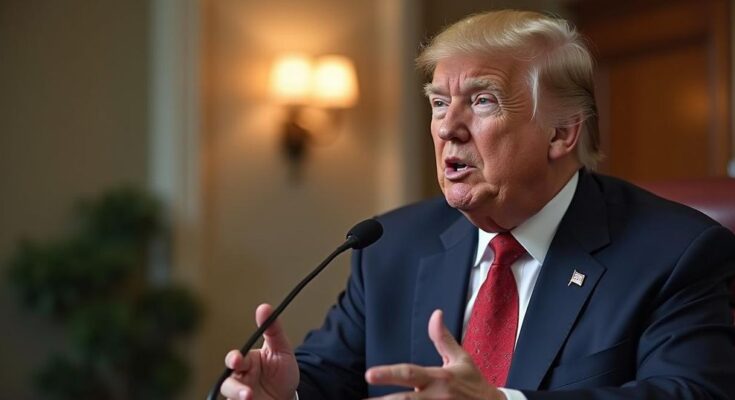UN Secretary-General António Guterres condemned the escalating violence in the Middle East, calling for a ceasefire amidst rising hostilities involving Israel, Iran, and Hezbollah. Recent military actions included Iran’s missile strikes on Israel and Israeli incursions in Lebanon. The humanitarian situation in Yemen is also of concern as military operations continue, affecting critical aid channels. Guterres’s statement highlights the urgent need for international diplomatic efforts to quell the violence and address humanitarian crises.
On Tuesday, as hostilities escalated across the Middle East, United Nations Secretary-General António Guterres issued a call for an immediate cessation of violence, stating unequivocally, “I condemn the broadening of the Middle East conflict, with escalation after escalation. This must stop. We absolutely need a ceasefire.” The rising tensions were marked by Iran’s launch of ballistic missiles at Israel shortly after Israel’s military incursion into southern Lebanon, which the Israeli forces characterized as limited military action. Reports indicated that approximately 180 missiles were fired by Iran, with the majority intercepted by Israeli defense systems. This escalation follows a series of significant military actions, including earlier Israeli airstrikes targeting the Hezbollah leader Hassan Nasrallah in Beirut’s southern suburbs. The situation remains fraught, particularly as the ongoing Gaza conflict enters its second year, which has seen increased cross-border confrontations between Israeli forces and Hezbollah. In a historical context, nearly two decades ago, similar hostilities culminated in a month-long conflict in Lebanon, which led to the adoption of UN Security Council Resolution 1701 in 2006, establishing a mandate for UN peacekeepers in the region. Additionally, following Houthi rebel attacks on Israeli urban centers, Israel conducted strikes in Yemen, targeting facilities in the crucial port city of Hudaydah. These attacks are critical as Hudaydah serves as a major entry point for humanitarian aid and essential supplies into Yemen, a nation embroiled in a crisis exacerbated by over a decade of conflict between government forces and Houthi rebels. Despite these military operations, UN officials affirmed that the ports in Hudaydah remain fully operational for humanitarian activities, albeit under strained conditions due to limited power supply for infrastructure in the region. The UN’s continued efforts to ensure humanitarian access reflect the severe humanitarian needs that have increased amid this ongoing conflict. As tensions escalate further in the Middle East, the international community faces an urgent obligation to pursue diplomatic resolutions and alleviate the profound humanitarian crises impacting millions. In summary, this illustrative command for peace from the UN Secretary-General underlines the urgent need to address the cycle of violence, emphasizing that continuous military escalation poses dire risks not only to regional stability but also to global security.
The escalating conflict in the Middle East, particularly involving Israel, Iran, and Hezbollah, reflects a long-standing and complex geopolitical struggle. The backdrop of the heightened tension includes the Gaza conflict, which has seen protracted violence, and cross-border skirmishes that have intensified these relations. The historical context includes significant resolutions from the UN, such as Resolution 1701, which aimed to restore peace in Lebanon post-conflict. Furthermore, the humanitarian situation in Yemen adds another layer of urgency as regional groups like the Houthis retaliate amid the ongoing Israeli military operations, impacting global maritime security and aid flow to affected regions.
In conclusion, the recent events across the Middle East underscore the critical nature of diplomatic intervention to halt the escalating cycle of violence. The UN’s call for a ceasefire reflects the need for an urgent and concerted effort to address not only military hostilities but also the underlying humanitarian crises affecting millions across the region. The implications of continued escalation are profound, potentially threatening broader regional and global stability.
Original Source: news.un.org




